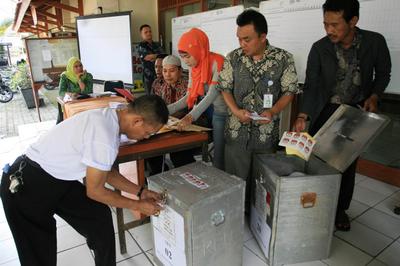on one side was Prabowo Subianto, the tough-talking, populist former son-in-law of long-time autocrat Suharto, whose openly xenophobic rhetoric scared investors but attracted those segments of the Indonesian electorate longing for a firm leader; and on the other side was Jokowo Widodo (Jokowi), a man from humble origins who had made his way from a small furniture business in Solo in Central Java to the governor’s office in the capital Jakarta.
The contest between these two men led to the dirtiest election campaign in Indonesian history. Advised by American consultants who previously had taught Republican candidates on how to drown out opponents in smear campaigns, Prabowo’s electoral machine spread false rumours that Jokowi was a Singaporean Chinese and a Christian. Jokowi, pushed into the defensive by the effectiveness of these attacks among Indonesia’s devout Muslim community, could never really develop his own narrative and platform. As a result, his once seemingly unassailable lead over Prabowo in the polls (in December 2013, he was ahead by 39 percentage points) melted away rapidly.
In the week before election day, the race was too close to call.
However, all credible quick count organisations declared Jokowi the winner of the elections on 9 July, with an average result of 52.5 to 47.5 per cent. Apparently, concerns about Prabowo’s human rights record as one of Suharto’s top generals, the ruthlessness of his campaign and his plans for dismantling Indonesia’s democratic institutions convinced a sufficiently large number of voters to throw their weight behind Jokowi.
Nevertheless, Prabowo refused to concede the election.
In the TV stations controlled by his political allies, Prabowo had quick count results published that showed him narrowly leading Jokowi. The four institutions Prabowo cited are either owned by his associates or funded by them, and have a long record of unreliability and partisanship. Prabowo, by pointing to these clearly manipulated quick counts, presumably aims to win time, as the Indonesian Electoral Commission will only announce its official result on or around 22 July. In the past, this official result has been almost identical to the quick counts done by the country’s established pollsters — the very institutions that have called the elections for Jokowi.
It is unlikely that Prabowo will be able to intervene in the official count in a way that could move an estimated three or four million votes — the amount necessary to secure victory for him. Should he unexpectedly succeed (by bribing election commission officials at various administrative levels), Indonesia would be in turmoil, with millions of Jokowi’s supporters certain to protest in the streets and demand the annulment of what would then have to be viewed as an illegitimate result. Such a scenario shouldn’t be ruled out completely, but it seems to be improbable at this point.
Much more plausible is that Jokowi and his running mate Jusuf Kalla will be sworn in as president and vice-president of Indonesia on 20 October 2014. This is an outcome that will preserve Indonesian democracy — a Prabowo victory, by contrast, would have led the country onto a path of political conflict, neo-authoritarian attacks and democratic regression.
Indonesia’s neighbours — including Australia — should also welcome Jokowi’s election. While he lacks the polished international experience of Yudhoyono, Jokowi is a rational and pragmatic politician, with whom most of Indonesia’s foreign partners will have no problems interacting. Prabowo, on the other hand, would have been highly unpredictable. Known for his short fuse and willingness to whip up nationalist sentiment if it suits his political agenda, Prabowo would have been a nightmare for the region.
This doesn’t mean, however, that Jokowi’s transition into the presidency will be smooth.
Jokowi’s campaign for the presidency — and the dramatic decline of his support in its final weeks — revealed significant divisions between him and his party, Megawati Sukarnoputri’s Indonesian Democratic Party of Struggle (PDI-P). These divisions are likely to dominate Jokowi’s first few years in office, with conflicts focusing on resources, positions and policies. Jokowi’s unwillingness to engage in traditional patronage politics has angered many in the party who hope that PDI-P’s return to power after ten years in opposition will benefit them materially.
Also, Jokowi will have to get used to the fact that ruling Indonesia is different from ruling Solo or Jakarta — something he refused to acknowledge throughout the campaign. And finally, he inherits an economy that needs urgent repair if it doesn’t want to fall behind its global competitors.
But whatever the problems are that Indonesia will face under Jokowi, they are preferable to the ones a Prabowo presidency would have brought upon this young and still vulnerable democracy.
Dr Marcus Mietzner is Associate Professor in the College of Asia and the Pacific, The Australian National University.

